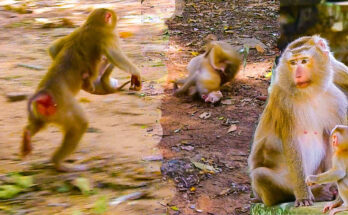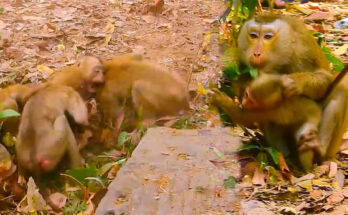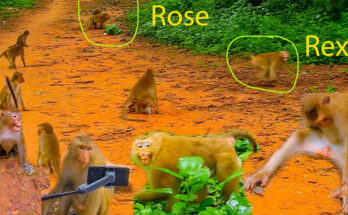Tough Love! Monkey SARIKA Trains Her Baby While Nursing — Baby Cries Loudly but Mama Stays Strong
Deep within the dense forest canopy, where the leaves whisper with the wind and birds sing in harmony with rustling branches, lived a devoted mother monkey named Sarika. She was one of the most respected females in the troop — a long-tailed macaque known not only for her striking golden-brown coat but for her no-nonsense parenting style. Now a mother to her first baby, a clingy and curious infant named Tanu, Sarika’s parenting was marked by discipline, patience, and a firm heart.
Tanu was still small, only a few weeks old, with soft fur, wide innocent eyes, and an appetite that seemed endless. He clung to his mother’s belly most of the day, squeaking and wriggling, always looking for attention, warmth, or milk. Sarika adored her baby, but she had a bigger mission — to teach Tanu how to survive. And for Sarika, that meant starting early.
One humid morning, the troop had moved into a clearing near the river. It was a perfect place to rest and forage, filled with edible leaves, wild berries, and shady rocks. While the older monkeys lazed around or groomed each other, Sarika saw an opportunity for training. She knew the jungle was full of dangers: predators, falling branches, and rival troops. She wanted her baby to grow strong, alert, and independent. And that didn’t come from constant cuddling.
So, Sarika made a bold move. She pulled Tanu off her chest and placed him on the soft earth beside her. He squealed immediately, startled by the sudden distance. His tiny arms stretched out, reaching for her fur, his lips quivering as he realized he wasn’t being nursed.
Tanu let out a loud cry.
Other monkeys turned their heads, surprised. Most monkey mothers would scoop up their baby instantly. But Sarika didn’t move. She simply sat beside him, watching, her eyes calm but firm.
This was her version of tough love.
Tanu flailed on the ground, kicking his legs and calling out in distress. His high-pitched cries echoed through the clearing. He was hungry. He wanted comfort. He wanted milk. He didn’t understand why Mama was being so distant. He tried crawling toward her, tripping over his own limbs, finally managing to grab her arm. He buried his face into her belly, hoping to nurse.
But Sarika gently pushed him back.
She wasn’t being cruel. She had already nursed him earlier that morning, and she knew he wasn’t starving — just dependent. She wanted him to learn patience and resilience. She gently guided him to sit instead, trying to teach him how to support himself. She encouraged him to look around, to see the troop, to listen to the sounds, and most importantly, to move without being held every second.
Tanu didn’t like it.
He screamed louder, his cries becoming sharp and panicked. But still, Sarika remained calm. She offered him a soft grooming session, licking his head and shoulders as reassurance, but refused to let him nurse. The lesson continued.
Hours passed. Tanu grew tired from crying. His energy dwindled. Eventually, he sat still, sniffled, and stared up at Sarika with a confused expression. He leaned against her leg, breathing heavily. For the first time, he didn’t demand milk — he just wanted closeness. And Sarika finally relented. She scooped him up, hugged him tightly, and nursed him.
It was a reward — not for his crying, but for calming down.
That moment of milk was sweeter than ever for Tanu. He nestled into her fur, eyes slowly closing as he fed. Sarika stroked his back gently, cooing low sounds to soothe him. She had shown strength, but she also showed love.
The next day, she repeated the training. This time, she let him sit farther away. Again, he cried, but not for as long. Day by day, Sarika taught him to sit up, balance, crawl, and eventually climb low branches. All the while, Tanu learned that milk and comfort didn’t always come immediately. He learned patience. He learned to wait. And slowly, he started to understand the boundaries his mother was teaching.
Other monkey mothers watched with mixed opinions. Some thought Sarika was too strict. Others admired her strength. But no one could deny that Tanu was becoming stronger, faster, and more alert than many babies his age.
One afternoon, when a sudden rustle startled the troop — the sign of a wild cat nearby — many babies clung tightly to their mothers in panic. But not Tanu. He instinctively moved to a low branch and crouched silently, watching with wide, sharp eyes. He had been trained to respond, not just react. Sarika was nearby, watching him with pride.
Tanu still cried sometimes, especially when he wanted milk before nap time. But he no longer lay flat in protest or screamed endlessly. He had learned his mother’s rhythm — and he trusted it. Their bond, while shaped through discipline, was deeply loving. Sarika always cuddled him at the end of each lesson. She always groomed him before bed. And her eyes always softened when he looked at her with those curious, ever-growing eyes.
Eventually, as Tanu grew into a young juvenile, he became one of the most independent youngsters in the troop. He climbed higher, explored farther, and played more confidently than many of his peers. And while other juveniles clung to their mothers’ backs during long migrations, Tanu walked beside Sarika, mimicking her movements.
Sarika’s method had worked.
Her tough love was not cold. It was thoughtful, intentional, and filled with care. She had understood what her baby needed — not just in the moment, but for the future. And because of that, she had raised a strong, smart, and resilient young monkey.
In the heart of the jungle, where survival is a daily challenge, that kind of love — the kind that trains, teaches, and strengthens — is a gift greater than constant comfort. It is the love that prepares a child to live, to lead, and to thrive.
And for Tanu, Sarika was not just a mother — she was his first teacher, his protector, and his hero.


